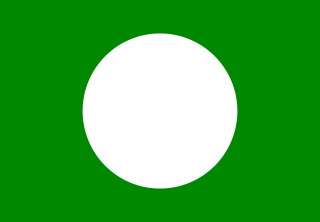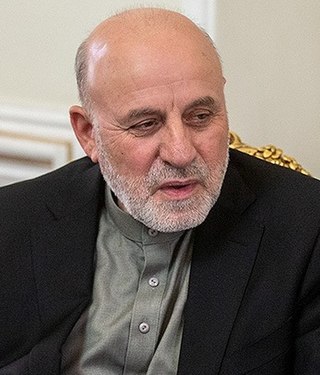
Afghanistan,officially the Islamic Emirate of Afghanistan,is a landlocked country located at the crossroads of Central Asia and South Asia. It is bordered by Pakistan to the east and south,Iran to the west,Turkmenistan to the northwest,Uzbekistan to the north,Tajikistan to the northeast,and China to the northeast and east. Occupying 652,864 square kilometers (252,072 sq mi) of land,the country is predominantly mountainous with plains in the north and the southwest,which are separated by the Hindu Kush mountain range. Kabul is the country's capital and largest city. According to the World Population review,as of 2023,Afghanistan's population is 43 million. The National Statistics Information Authority of Afghanistan estimated the population to be 32.9 million as of 2020.

Mohammad Ismail Khan is an Afghan former politician who served as Minister of Energy and Water from 2005 to 2013 and before that served as the governor of Herat Province. Originally a captain in the Afghan Army,he is widely known as a former warlord who controlled a large mujahideen force,mainly his fellow Tajiks from western Afghanistan,during the Soviet–Afghan War.

The Taliban,which also refers to itself by its state name,the Islamic Emirate of Afghanistan,is an Afghan political and militant movement with an ideology comprising elements of Pashtun nationalism and the Deobandi movement of Islamic fundamentalism. It ruled approximately 75% of Afghanistan from 1996 to 2001,before it was overthrown by an American invasion after the September 11th attacks carried out by the Taliban's ally al-Qaeda. The Taliban recaptured Kabul in August 2021 following the departure of coalition forces,after 20 years of Taliban insurgency,and now controls the entire country. The Taliban government is not recognized by any country and has been internationally condemned for restricting human rights,including women's rights to work and have an education.

Hamid Karzai is an Afghan politician who served as the fourth president of Afghanistan from July 2002 to September 2014,including as the first elected president of the Islamic Republic of Afghanistan from December 2004 to September 2014. He previously served as Chairman of the Afghan Interim Administration from December 2001 to July 2002. He is the chief (khān) of the Popalzai Durrani tribe of Pashtuns in Kandahar Province.

Gulbuddin Hekmatyar is an Afghan politician,and former mujahideen leader and drug trafficker. He is the founder and current leader of the Hezb-e-Islami Gulbuddin political party,so called after Mohammad Yunus Khalis split from Hezbi Islami in 1979 to found Hezb-i Islami Khalis. He twice served as prime minister during the 1990s.

Anwar ul-Haq Ahady is an Afghan politician and former Minister of Commerce and Industry. He had served as the nation's Finance Minister from December 2004 to February 5,2009. From 2002 to 2004,he was the head of Da Afghanistan Bank,the central bank of Afghanistan. He is also an academic and writer.

Kunduz is a city in northern Afghanistan and the capital of Kunduz Province. The city has an estimated population of about 268,893 as of 2015,making it about the seventh largest city of Afghanistan,and the largest city in northeastern Afghanistan. Kunduz is in the historical Tokharistan region of Bactria,near the confluence of the Kunduz River with the Khanabad River. Kunduz is linked by highways with Kabul to the south,Mazar-i-Sharif to the west,and Badakhshan to the east. Kunduz is also linked with Dushanbe in Tajikistan to the north,via the Afghan dry port of Sherkhan Bandar. This city is famous in Afghanistan for its watermelon production.

The Malaysian Islamic Party,also known as the Pan-Malaysian Islamic Party,is an Islamist political party in Malaysia. Ideologically focused on Islamic fundamentalism. PAS's electoral base is largely centred around Peninsular Malaysia's rural northern and east coast regions particularly the states of Kelantan,Terengganu,Perlis,and Kedah. They also gained significant support in the rural areas of Perak and Pahang in the last 2022 general election and the 2023 state elections;dubbed as the "Green Wave".

Kapisa is the smallest of Afghanistan's thirty-four provinces and is located in the north-east of the country. It has an estimated population of 496,840 people and an area of 1,842 km2 (711 sq mi),making it the most densely populated province apart from Kabul Province. It borders Panjshir Province to the north,Laghman Province to the east,Kabul Province to the south and Parwan Province to the west. Mahmud-i-Raqi is the provincial capital,while the most populous city and district of Kapisa is Nijrab.

Atta Muhammad Nur is an Afghan exiled politician and former Mujahid Leader who served as the Governor of Balkh Province in Afghanistan from 2004 to January 25,2018. An ethnic Tajik,he worked to educate the Mujahideen after the 1979 Soviet invasion of Afghanistan,gaining the nickname "The Teacher". He then became a mujahideen resistance commander for the Jamiat-e Islami against the Soviets.

The Northern Alliance,officially known as the United Islamic National Front for the Salvation of Afghanistan,was a military alliance of groups that operated between early 1992 and 2001 following the dissolution of the Soviet Union. At that time,many non-Pashtun Northerners originally with the Republic of Afghanistan led by Mohammad Najibullah became disaffected with Pashtun Khalqist Afghan Army officers holding control over non-Pashtun militias in the North. Defectors such as Rashid Dostum and Abdul Momim allied with Ahmad Shah Massoud and Ali Mazari forming the Northern Alliance. The alliance's capture of Mazar-i-Sharif and more importantly the supplies kept there crippled the Afghan military and began the end of Najibullah's government. Following the collapse of Najibullah's government the Alliance would fall with a Second Civil War breaking out however following the Islamic Emirate of Afghanistan's (Taliban) takeover of Kabul,The United Front was reassembled.
Taj Mohammad Wardak is an Afghan politician from the National Independence Party of Afghanistan. An ethnic Pashtun,he spent some of the period of the Taliban's administration in the United States of America,and became an American citizen.

Mohammad Umer Daudzai is a politician in Afghanistan,who most recently served as President Ashraf Ghani's Special Envoy for Regional Consensus Building on Peace and as Head of the High Peace Council (HPC) Secretariat for a few months. He was later appointed President Ghani's Campaign Manager for the 2019 Presidential elections. After a career with international non-governmental organizations including the United Nations Development Program in Geneva,Daudzai started work as two term Chief of Staff of Afghan President Hamid Karzai from 2003 to 2005 and then from 2007 to around 2010. From 2005 until 2007,President Karzai appointed him as Afghan Ambassador in Iran. He then served as the Afghan Ambassador to Pakistan,tasked with advancing efforts to reach a political solution to the war in Afghanistan. In September 2013,Daudzai was asked to serve as Afghan Minister of Interior in Kabul and ensure security for the challenging 2014 presidential elections.

The Afghan conflict is a term that refers to the series of events that have kept Afghanistan in a near-continuous state of armed conflict since the 1970s. Early instability followed the collapse of the Kingdom of Afghanistan in the largely non-violent 1973 coup d'état,which deposed Afghan monarch Mohammad Zahir Shah in absentia,ending his 40-year-long reign. With the concurrent establishment of the Republic of Afghanistan,headed by Mohammad Daoud Khan,the country's relatively peaceful and stable period in modern history came to an end. However,all-out fighting did not erupt until after 1978,when the Saur Revolution violently overthrew Khan's government and established the Democratic Republic of Afghanistan. Subsequent unrest over the radical reforms that were being pushed by the then-ruling People's Democratic Party of Afghanistan (PDPA) led to unprecedented violence,prompting a large-scale pro-PDPA military intervention by the Soviet Union in 1979. In the ensuing Soviet–Afghan War,the anti-Soviet Afghan mujahideen received extensive support from Pakistan,the United States,and Saudi Arabia in a joint covert effort that was dubbed Operation Cyclone.
Sayed Noorullah Murad is an Afghan politician,military commander and member of the Afghan cabinet during the presidency of Hamid Karzai. He was born in Kunduz city in the north of Afghanistan. His father Mawlawi Abdul Jalil Faqiri,is a famous religious and social leader of Afghanistan.

Lt. Gen. Murad Ali Murad is a politician and military personnel in Afghanistan,previously serving as Deputy Interior Minister for Security and Governor of Daykundi.

Sher Mohammad Abbas Stanikzai is a senior member of the Afghan Taliban and the country's Deputy Minister of Foreign Affairs in the internationally unrecognized Taliban regime since 7 September 2021.

The Islamic Republic of Afghanistan was a presidential republic in Afghanistan from 2004 to 2021. The state was established to replace the Afghan interim (2001–2002) and transitional (2002–2004) administrations,which were formed after the 2001 United States invasion of Afghanistan that had toppled the partially recognized Taliban-ruled Islamic Emirate of Afghanistan. However,on 15 August 2021,the country was recaptured by the Taliban,which marked the end of the 2001–2021 war,the longest war in US history. This led to the overthrow of the Islamic Republic,led by President Ashraf Ghani,and the reinstatement of the Islamic Emirate under the control of the Taliban. While the United Nations still recognizes the Islamic Republic as the legitimate government of Afghanistan,this toppled regime controls no portion of the country today,nor does it operate in exile;it effectively no longer exists. The Islamic Emirate is the de facto ruling government. The US–Taliban deal,signed on 29 February 2020 in Qatar,was one of the critical events that caused the collapse of the Afghan National Security Forces (ANSF). Following the deal,the US dramatically reduced the number of air attacks and deprived the ANSF of a critical edge in fighting the Taliban insurgency,leading to the Taliban takeover of Kabul.

The Taliban has ruled Afghanistan as the Islamic Emirate of Afghanistan since taking control by force in 2021,overthrowing the internationally recognized Islamic Republic of Afghanistan. The takeover was widely criticized by the international community,and no countries have extended de jure diplomatic recognition to the new regime,despite nominally maintaining relations with Afghanistan. The Taliban has campaigned for international recognition since the takeover. Several countries have vowed never to recognize the Islamic Emirate,and others have said they will do so only if human rights in the country are respected. Some countries have accredited Taliban diplomats at the chargéd'affaires level despite not recognizing the Islamic Emirate. In September 2023,the People's Republic of China became the first country to formally name a new ambassador to the country since the takeover,and in January 2024 recognized the Taliban's envoy to China;however,the PRC still does not formally recognize the Taliban as the legitimate government of Afghanistan. The United Arab Emirates also accepted a Taliban appointed diplomat as Afghanistan's new ambassador in August 2024.
The following is an outline of the series of events that led up the War in Afghanistan (2001–2021).
















